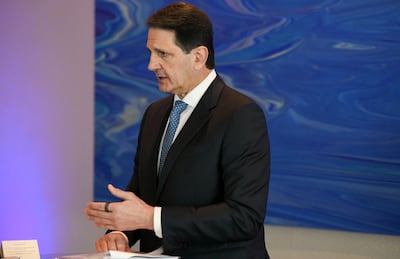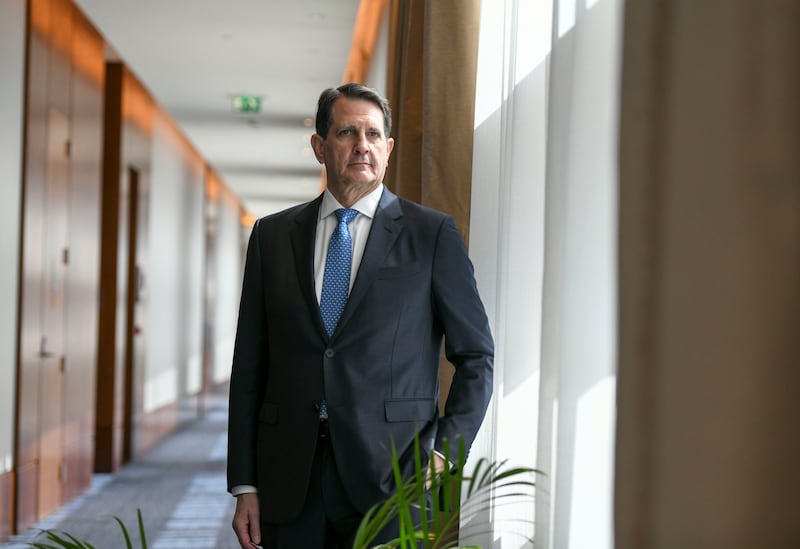Golub Capital, a $60-billion direct lender and asset manager, plans to set up a UAE office to broaden the pool of its regional investors and raise more money for its private credit strategies, its chief executive has said.
A permanent presence in the UAE will not only open new avenues of funding for Golub in the Arab world’s second-largest economy, but also across the wider Gulf and Mena regions, Lawrence Golub told The National in an interview in Abu Dhabi.
A future base in the UAE is in line with the company’s plans to increase its global footprint. However, Golub has yet to decide where in the Emirates it will set up its base.
“At some point in the future, we'll have a permanent office here,” Mr Golub said of the UAE.
“We have expanded to London and we have 20 people there. We just recently announced opening a small office in Hong Kong. So, opening an office in the Gulf region will be very consistent with the other places. We are big believers in having regular local presence."
The primary focus of the company’s office in the UAE would be to raise funds for its private credit strategies as it maintains its focus on its core industry verticals.
Established in 1994, Golub lends to companies in four sectors: software and technology, financial services and diversified industries, restaurant and retail, and health care.
It lends primarily to private equity-backed, mid-market companies – commercial entities that are larger than small and medium-sized organisations but smaller than big corporations – in the US.
The company has managed more than $150 billion in loans since 2004. It was the lead lender in 90 per cent of the more than 2,300 transactions it has carried out during that period in its private credit business.
Private credit refers to non-bank lending where the debt is not issued or traded on the public markets.
It is a fast-growing asset class that extends loans to smaller companies and is referred to as private lending.
Private credit offers direct lending, broader syndicated and mezzanine loans.
The size of the private credit market at the start of this year was about $1.4 trillion, compared with $875 billion in 2020. The market is estimated to grow to $2.3 trillion by 2027, according to Morgan Stanley data.
Investors are increasingly allocating resources to the private credit market, with a host of banks and asset managers pouring capital into the fast-growing industry.
Private credit investments are also gaining traction in the UAE, with sovereign and private investors making increasingly larger bets on the industry.
In September, Mubadala Investment Company, Abu Dhabi’s sovereign investment arm, teamed up with New York-based alternative asset manager Blue Owl Capital to co-invest in private credit opportunities amid the tightening monetary environment around the world.
The partnership was established with a $1 billion commitment to Blue Owl’s credit platform and will initially focus on its technology lending strategy, which provides financing solutions for several technology and software companies, Mubadala said at the time.
In January, Mubadala also signed a joint venture with Alpha Dhabi Holding, a unit of Abu Dhabi's International Holding Company, to co-invest in private credit opportunities.

As part of that partnership, the two companies will collectively invest up to Dh9 billion ($2.45 billion) over the next five years, leveraging Mubadala’s long-term and strategic partnership with Apollo Global Management.
In October, Mubadala and private equity firm KKR forged an alliance in which both will co-invest across performing private credit opportunities in the Asia-Pacific region to address a shortage of capital.
Last year, Abu Dhabi Investment Authority (Adia), one of the world's largest sovereign investors, agreed to double its investment in Qualitas, an Australian property private credit company.
Mr Golub said his company is keen to build on its existing relationships with regional investors.
“We've had investors here for almost a decade and [I'm] embarrassed to say that our first investors were people who found us. We were very US-centric and had not really been creative about making inroads,” he said.
“But those first investors found us and did their due diligence ... [as they] are smart, they're open, they're forward-looking.
“I really have incredible affection for the Gulf region."
The company this year has had several conversations with some major financial institutions in the region to form potential joint ventures.
“We're not there yet," he said, adding "business [in the Gulf region] is favourable and it ought to be a good market.”
Although the private equity sector has faced headwinds this year, the industry is “very good at recognising the course correction” and industry players are doing add-on acquisitions.
“We've seen this year that add-on acquisitions are being one of the biggest demands for credit. We're starting to see now at the tail end of 2023, a slow increase in new [private equity] deals,” he said.
Currently the “there aren’t any areas where there's deep enough distress”.
“New deals are running at about half the long-term average rate and it's our expectation they'll pick back up to the long-term average rate over the next 18 months," Mr Golub said.
Outside the US, certain markets such as Germany and some segments of the Chinese economy are relatively weak.
However, the US economy has been resilient and it's “viewed as a relatively safe place”, he said.
“[The] US economy won't break any growth record but it's less likely to have major long-lasting downturn."







